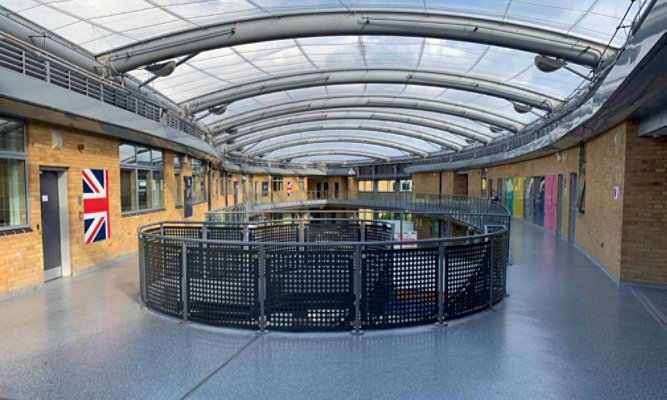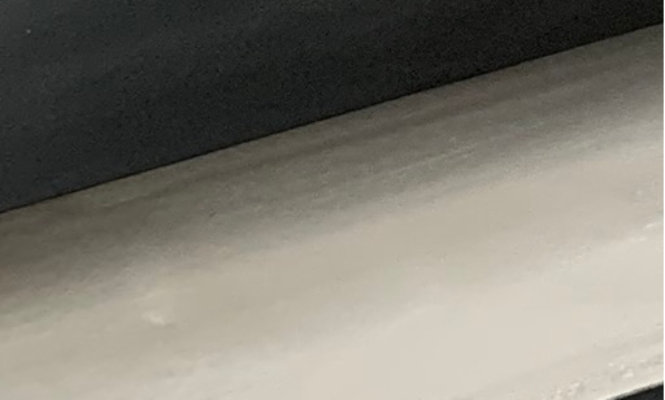
Design Recommendations for Hygienic Flooring in Food and Beverage Facilities
Every element of a food and beverage facility must be designed from the ground up to support a hygienic, safe and sanitary environment to protect both employees and consumers—including the flooring itself. Without adequate protection, concrete floors can become difficult to clean and disinfect, making them a breeding ground for harmful microorganisms that can then be transported into food products or packages.
The right hygienic floor coating solution can help safeguard products and workers in food and beverage facilities.
6 Considerations for Hygienic Flooring in the Food and Beverage Industry
In the food and beverage industry, facilities have to follow strict health and hygiene codes. Flooring systems in these facilities should not only meet regulatory requirements but also generally support a safe and sanitary production environment.
When it comes to choosing hygienic flooring for a food and beverage facility, there are several considerations to keep in mind.
1. Slip Resistant
Flooring in food and beverage facilities is subject to constant exposure to products, particles, liquid spills, oils and greases that can create a tripping hazard for workers and visitors. Additionally, when messes are cleaned up, the wet floor conditions may make the floor even more slippery.
To ensure a safe working environment for employees and guests, it’s essential that food and beverage industry flooring offers superior non-slip properties to promote safety and help prevent slips and falls, even in wet conditions.
2. Easy to Clean
Spills, accidents, runoff and messes are common in food and beverage processing. To make it easier to clean and sanitise floors in these spaces, the surface should be seamless so there are no cracks or crevices where dirt, dust or grime can accumulate.
Additionally, food and beverage facility floors undergo regular and aggressive cleaning processes to ensure they meet hygienic and sanitation standards. These routines often involve harsh chemical cleansers and hot water, so the flooring should have thermal shock and chemical resistance properties that prevent cleaning from causing wear and tear over time.
3. Antimicrobial
Floors in food and beverage facilities must be free from microbial life and prevent the growth of bacteria that can harm consumers and workers alike. A food safe hygienic flooring system should be formulated to provide antimicrobial protection that inhibits the growth of microbes, bacteria like Listeria, mould, mildew and fungi.
4. Low VOC
Some floor coating products produce volatile organic compounds (VOCs) that leave strong odours and can cause serious health effects or taint food and beverage products. Food safe hygienic floor coating products should emit low levels of VOCs.
5. Impermeable
Another important characteristicof food safe hygienic flooring is impermeability. An impermeable barrier prevents water, chemicals, organic byproducts, dirt or bacteria from breaching the concrete substrate below and creating a space that is difficult to clean and creates the perfect environment for mould, mildew and fungi growth.
6. Durable
Food and beverage facility flooring is constantly assaulted by mechanical shocks, forklift traffic, wear and tear, abrasions, impacts, heavy loads, and falling items—any of which can crack or damage the floor unless it is protected with a durable coating system. On untreated floors, cracks or damage provide areas where dirt, grime and bacteria can hide or where water and other liquids can pool, potentially creating mildew and mould.
Food Safe Hygienic Flooring: 5 Design Recommendations to Follow
Floors and floor coating systems in food and beverage facilities must follow several design requirements in order to meet industry sanitation and hygiene standards.
1. Choose an Antimicrobial Formulation
Ideally, food safe flooring systems should be specially formulated to prevent the growth and spread of pathogens, bacteria, microbes and fungi. Polyurethane floor coatings are already inhospitable to many different microorganisms, but they can also be ordered in antimicrobial formulations that provide additional protection.
2. Consider Slip Resistance vs. Cleanability
Slip resistance is an essential element in food and beverage facilities; when spills occur or floor surfaces are wet, anti-slip flooring helps prevent slip and fall injuries among workers. However, non-slip flooring requires increased roughness and texture, which can make the floor surface more difficult to clean.
Various areas of the facility will require different levels of slip resistance, depending on the activities occurring in the space, how the floor is cleaned and what possible contaminants are present.
Polyurethane hygienic floor coating systems are available in both textured and smooth finishes, providing more or less slip resistance as needed in the space. Textured anti-slip flooring can be cleaned with appropriate regimes, including with hot water, steam or aggressive chemicals. Smooth flooring, while providing less slip resistance, can be swept or washed as needed.
Consider the trade-off between slip resistance and cleanability during the design of food and beverage facility flooring.
3. Install Flooring with a Seamless, Non-Porous Finish
In food and beverage facilities, every seam, joint, grout and crevice is a weak point in the flooring system. These areas are extremely difficult to clean and create a space where dirt can accumulate and microbes can breed. Additionally, joints and grouts often have lower chemical resistance and durability than the surrounding floor, creating an additional contamination risk.
While these weak points cannot be eliminated completely, a seamless floor coating system, such as a polyurethane coating, significantly reduces the existence of joints, grouts and crevices. Resin floor coatings are fluid-installed, and the resulting finish is a seamless, non-porous surface with virtually no weak points like joints, crevices or grout lines.
4. Ensure Floors Slope Toward Drains
When water is used in cleaning and sanitation regimes, moisture can puddle on the floor. If puddling occurs after a washdown, it creates a wet area that is not only a slipping hazard for employees but also an attractive environment for mould, mildew, fungi and dangerous pathogens such as Escherichia coli (E. coli), Salmonella and Listeria.
To prevent puddling, ensure the flooring system is designed to slope toward drains. Fortunately, creating effective slope drainage is easy with Sherwin-Williams underlayment screeds that can be quickly installed with our hygienic floor finishes.
5. Make Sure Flooring Is Resistant to Thermal Shocks and Chemicals
Food and beverage facilities are harsh environments. Very hot water or steam is used to clean floor surfaces, floors experience extreme temperature changes and the floor surface is in regular contact with food byproducts, hazardous chemicals and aggressive cleaning agents. All these conditions can take a toll on flooring that is not built to withstand this type of damage—and if damage occurs, it leaves the floor vulnerable to dirt accumulation bacteria growth as well as creates an unsafe workplace.
Resin flooring systems are highly resistant to chemicals and thermal shocks. Polyurethane floor coatings can perform ideally under food and beverage facility conditions, including exposure to high concentrations of chemicals as well as moisture and temperature changes.
How to Find Hygienic Flooring for Food and Beverage Facilities
Choosing the right floor coating solution is an important part of designing a safe and hygienic food and beverage facility.
Resin floor coating systems are ideal for food and beverage environments because of their superior durability and excellent resistance to chemicals, impacts, abrasions, thermal shocks and wear and tear. Additionally, polyurethane floor coatings are easy to clean, non-slip and result in a seamless, fluid-applied surface, creating an attractive and sanitary floor system that will last for years to come.
When upgrading, designing or building a food and beverage facility, turn to resin floor coatings.
Shop Food Grade Hygienic Floor Coatings Solutions at Sherwin-Williams
Sherwin-Williams is the leading provider of floor coatings and linings for the food and beverage industry. Our line of high performance resin flooring offers superior resistance to moisture, chemicals, impacts and abrasions. With our durable, easy-to-clean and long-lasting food and beverage flooring solutions, you can extend the lifespan of your manufacturing or processing plant floors and experience cost savings for years to come.
Contact a Sherwin-Williams representative today to learn more about our food-safe polyurethane flooring solutions for the food and beverage industry.
Discover More
Industry Expertise and Innovation
See how we help customers find customised solutions for their project and application challenges.
Resin Flooring Resources
Explore system documentation, webinars, and answers to application challenges.
LEARN MOREProduct Lookup
Find out more about our innovative coatings for a variety of industries.
FIND A SYSTEM



